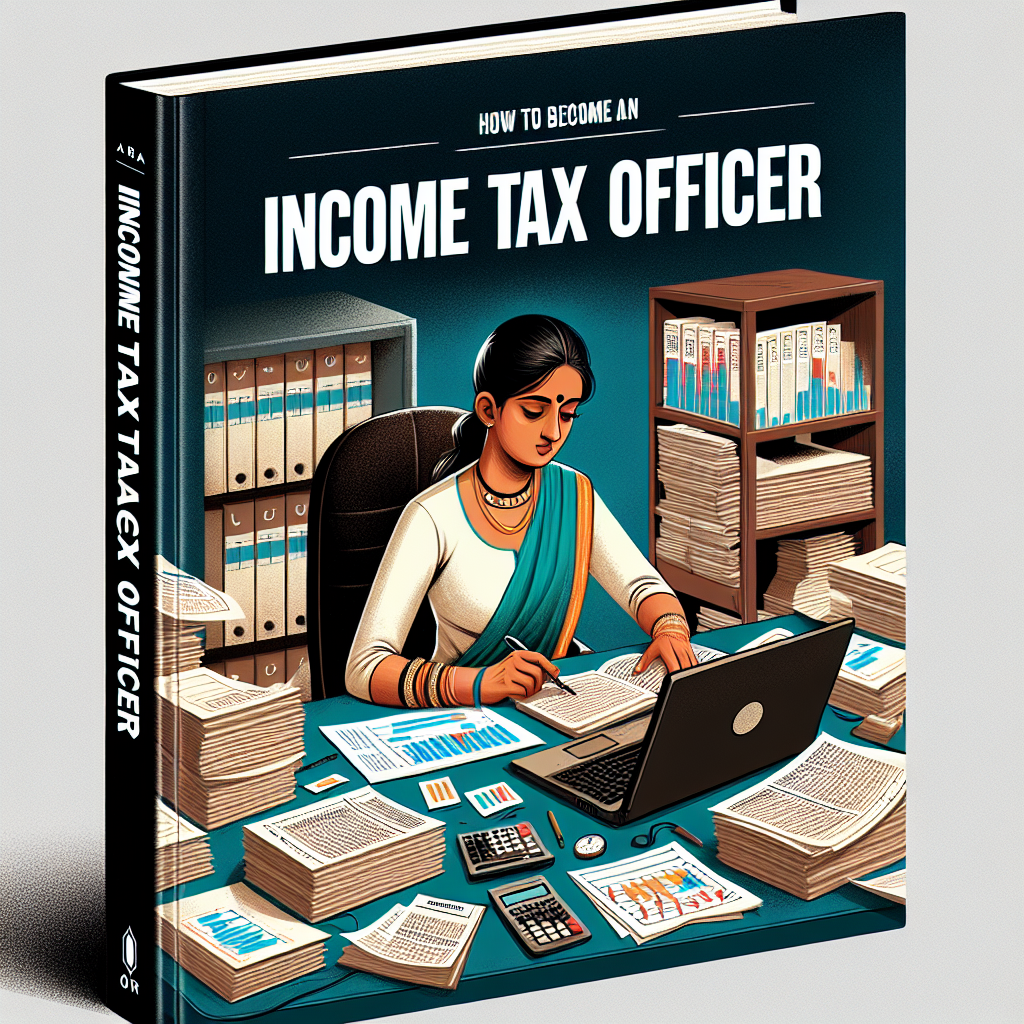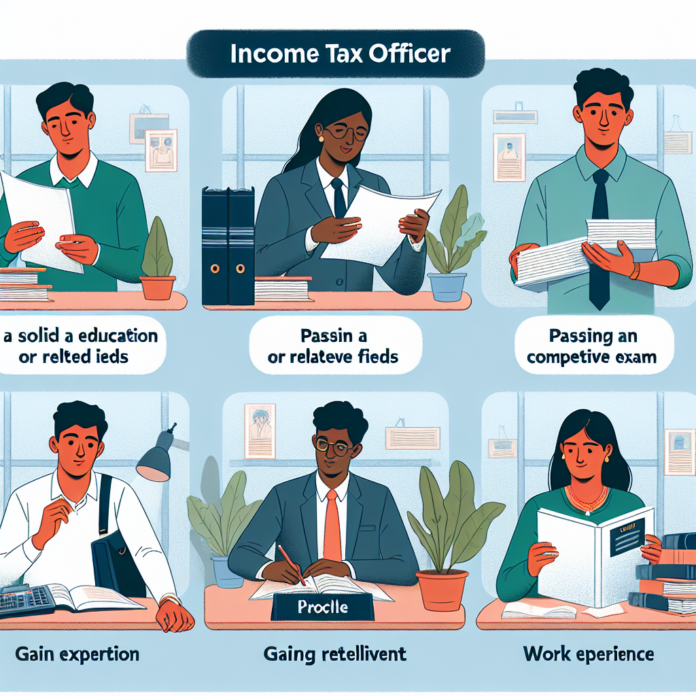-
Table of Contents
- How to Become an Income Tax Officer
- 1. Understand the Role of an Income Tax Officer
- 2. Obtain the Required Education and Qualifications
- Earn a Bachelor’s Degree
- Gain Relevant Work Experience
- Obtain Professional Certifications
- 3. Prepare for the Income Tax Officer Exam
- Study the Syllabus
- Utilize Study Materials
- Join Study Groups or Coaching Classes
- 4. Apply for the Income Tax Officer Exam
- 5. Clear the Income Tax Officer Exam
- Manage Your Time Effectively
- Practice Previous Year Question Papers
- Stay Updated with Current Affairs
- 6. Clear the Interview and Selection Process
- Research the Organization
- Prepare for Common Interview Questions
- Showcase Your Soft Skills
- Summary
How to Become an Income Tax Officer

Are you interested in a career as an income tax officer? Becoming an income tax officer can be a rewarding and challenging profession. It requires a strong understanding of tax laws, excellent analytical skills, and the ability to work with complex financial information. In this article, we will guide you through the steps to become an income tax officer, providing valuable insights and tips along the way.
1. Understand the Role of an Income Tax Officer
Before embarking on the journey to become an income tax officer, it is essential to have a clear understanding of the role and responsibilities involved. Income tax officers are responsible for enforcing tax laws, conducting audits, and ensuring compliance with tax regulations. They play a crucial role in collecting revenue for the government and maintaining the integrity of the tax system.
As an income tax officer, you will be responsible for:
- Assessing and verifying tax returns
- Conducting tax audits and investigations
- Providing guidance and assistance to taxpayers
- Identifying tax evasion and fraud
- Resolving tax-related disputes
2. Obtain the Required Education and Qualifications
To become an income tax officer, you need to meet certain educational and qualification requirements. The specific requirements may vary depending on the country or region you are in, but generally, the following steps are necessary:
Earn a Bachelor’s Degree
Most countries require a bachelor’s degree in accounting, finance, economics, or a related field to become an income tax officer. A strong foundation in these subjects will provide you with the necessary knowledge and skills to understand tax laws and regulations.
Gain Relevant Work Experience
While not always mandatory, gaining relevant work experience in the field of taxation can significantly enhance your chances of becoming an income tax officer. Consider internships or entry-level positions in tax firms, government agencies, or accounting firms to gain practical experience and exposure to tax-related work.
Obtain Professional Certifications
Professional certifications can demonstrate your expertise and commitment to the field of taxation. In many countries, obtaining a professional certification, such as the Certified Public Accountant (CPA) or Chartered Accountant (CA), is highly recommended or even required to become an income tax officer.
3. Prepare for the Income Tax Officer Exam
Once you have met the educational and qualification requirements, the next step is to prepare for the income tax officer exam. The exam is designed to assess your knowledge of tax laws, accounting principles, and analytical skills. Here are some tips to help you prepare:
Study the Syllabus
Obtain the syllabus for the income tax officer exam and carefully review the topics that will be covered. Create a study plan and allocate sufficient time to each subject to ensure comprehensive preparation.
Utilize Study Materials
There are various study materials available, such as textbooks, online courses, and practice exams, to help you prepare for the income tax officer exam. Utilize these resources to deepen your understanding of the subject matter and practice solving exam-style questions.
Join Study Groups or Coaching Classes
Consider joining study groups or enrolling in coaching classes to enhance your preparation. Collaborating with fellow aspirants can provide valuable insights and support, while coaching classes can offer structured guidance and expert advice.
4. Apply for the Income Tax Officer Exam
Once you feel confident in your preparation, it’s time to apply for the income tax officer exam. The application process may vary depending on the country or region, but generally, you will need to:
- Fill out the application form accurately and completely
- Submit the required documents, such as educational certificates and identification proof
- Pay the application fee, if applicable
Ensure that you meet all the eligibility criteria and submit your application before the deadline. Keep track of any updates or notifications regarding the exam schedule and venue.
5. Clear the Income Tax Officer Exam
The income tax officer exam is a rigorous and competitive process. To increase your chances of success, follow these tips:
Manage Your Time Effectively
During the exam, time management is crucial. Read the questions carefully, allocate time to each section, and prioritize the questions you are confident in answering. Avoid spending too much time on a single question, as it may affect your overall performance.
Practice Previous Year Question Papers
Practicing previous year question papers can give you an idea of the exam pattern and help you identify areas where you need to improve. Familiarize yourself with the format and structure of the exam to reduce anxiety and perform better on the actual day.
Stay Updated with Current Affairs
Stay updated with the latest developments in the field of taxation and current affairs related to the economy. This will not only help you in the written exam but also in the interview round, where your knowledge of current affairs may be tested.
6. Clear the Interview and Selection Process
After successfully clearing the written exam, you will be called for an interview and selection process. This is an opportunity for the authorities to assess your communication skills, problem-solving abilities, and suitability for the role of an income tax officer. Here are some tips to help you excel in this stage:
Research the Organization
Before the interview, research the organization and familiarize yourself with its mission, values, and recent initiatives. This will demonstrate your interest and commitment to the role.
Prepare for Common Interview Questions
Practice answering common interview questions, such as your strengths and weaknesses, your understanding of tax laws, and how you handle challenging situations. Prepare concise and well-thought-out responses to showcase your knowledge and skills.
Showcase Your Soft Skills
During the interview, emphasize your soft skills, such as attention to detail, problem-solving, and teamwork. Provide examples from your previous experiences that highlight these skills and demonstrate your ability to handle the responsibilities of an income tax officer.
Summary
Becoming an income tax officer requires a combination of education, qualifications, and preparation. By understanding the role, obtaining the necessary education and certifications, preparing for the exam, and excelling in the interview process, you can increase your chances of becoming a successful income tax officer. Remember to stay updated with the latest developments in tax laws and regulations to excel in your career and contribute to the efficient functioning of the tax system.






